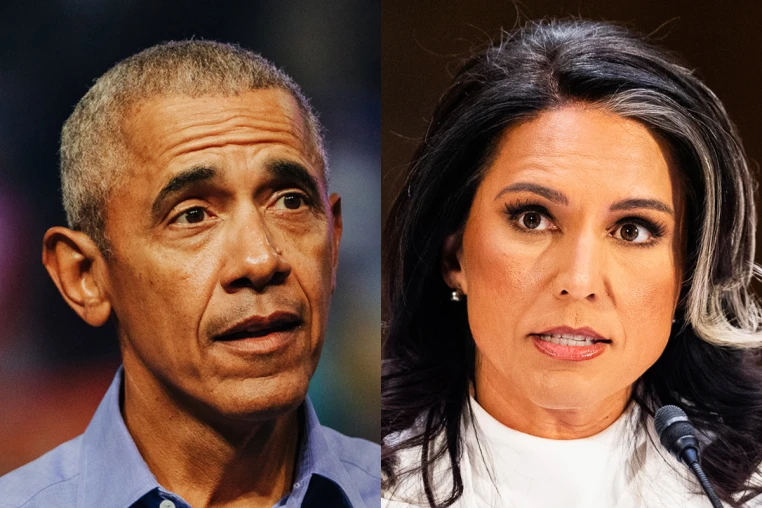Tulsi Gabbard’s 'Treason' Allegation Triggers High‑Wire Act for Obama World
By Edwin V. Christopher

Tulsi Gabbard, now serving as Director of National Intelligence, has ignited a political firestorm by alleging that former President Barack Obama and a cadre of senior national security officials orchestrated a “treasonous conspiracy” to subvert Donald Trump’s 2016 electoral victory. Gabbard publicly accused the Obama administration of manufacturing intelligence—despite post‑election shifts in threat assessments—to cast doubt on the legitimacy of the 2016 result and launch investigations that persist today She alleged that experts and agencies knowingly promoted a false narrative linking Trump to Russia based on discredited sources like the Steele dossier and described the effort as a years‑long coup Gabbard referred over a hundred declassified pages and retracted documents to the Department of Justice for investigation, naming figures including James Clapper, John Brennan, James Comey, Susan Rice, John Kerry, and Andrew McCabe Critics swiftly challenged Gabbard’s assertions, emphasizing that her claims lack legal basis and contradict extensive prior investigations including the Mueller report, DOJ Inspector General reviews, and bipartisan Senate and House Intelligence Committee findings These long‑form inquiries reaffirmed that Russia conducted sweeping interference in the 2016 election though without proving actionable collusion by Trump’s campaign—and found no evidence of intelligence fabrication tied to partisan motives Legal analysts such as former DOJ official Elliot Williams argue that Gabbard’s allegations do not meet constitutional definitions of treason or seditious conduct Constitutional treason requires overt acts such as wage of war against the United States or materially aiding enemies, neither of which apply here Williams also emphasized presidential immunity protections that shield former presidents like Obama from criminal prosecution for official acts even if wrongdoing were alleged High‑profile GOP figures have seized Gabbard’s documents as political leverage Senators Lindsey Graham and John Cornyn formally called on Attorney General Pam Bondi to appoint a special counsel to investigate Gabbard’s allegations They argued the DOJ should pursue inquiries into whether national security apparatus was weaponized for political ends—even though prior inquiries concluded otherwise At the White House, Attorney General Bondi confirmed the DOJ has established a “strike force” tasked with reviewing the new intelligence referred by Gabbard While the department signaled full cooperation, it noted the formidable legal hurdles involved in pursuing charges against former administration officials due to presidential immunity and the statute of limitations The controversy escalated as former President Obama’s office issued a rare statement denouncing the allegations as “outrageous” and a “weak attempt at distraction,” meant to deflect from ongoing scandal surrounding the administration’s handling of Jeffrey Epstein‑related documents Critics and Democratic lawmakers echoed the rebuttal, asserting that Gabbard’s claims serve diversionary political strategy—not constitutional accountability Gabbard’s combative press posture further deepened tensions; she rebuked reporters for questioning the timing and validity of her declassified memos—especially given that key intelligence figures raised concerns long ago—and accused journalists of intentionally conflating Russian influence assessments with baseless vote‑machine hacking claims She also sparred publicly with Washington Post reporter Ellen Nakashima, accusing her mischaracterization of the intelligence release added confusion to the public debate The unfolding affair places policymakers in what observers describe as a precarious balance: the Trump‑aligned DOJ maneuvering to legitimize previously discredited claims, while intelligence professionals and scholars navigate legal complexity tied to executive branch safeguards The sudden relitigation of Russiagate has drawn widespread skepticism even among Republican signatories of the Senate Intelligence Committee report, including then‑Chairman Marco Rubio, who maintained the Obama‑era conclusions about Russian influence remain intact Meanwhile, Speaker of the House Mike Johnson publicly signaled willingness to subpoena Obama to testify before Congress, citing Gabbard’s newly declassified materials as justification for legislative oversight and accountability measures Critics warn such actions risk eroding norms around post‑presidential immunity and democratic transition protections The political fallout reflects broader turbulence in Washington under President Trump’s second term—marked by a high‑stakes struggle over competing narratives about national security, institutional trust, and the bounds of executive investigation Analysts warn that the episode underscores deep partisan divide and may establish dangerous precedent for renewing decades‑old political disputes via intelligence referrals Observers emphasize that without new concrete evidence, this high‑wire act may do more to inflame polarization than deliver credible justice.